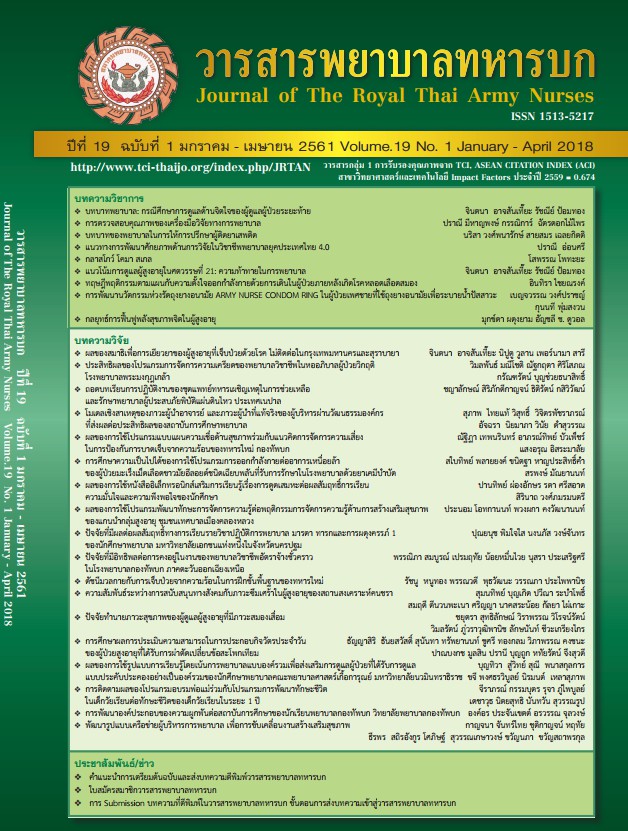ถอดบทเรียนการปฏิบัติงานของชุดแพทย์ทหารเผชิญเหตุ ในการช่วยเหลือและรักษาพยาบาลผู้ประสบภัยพิบัติแผ่นดินไหว ประเทศเนปาล
Abstract
การถอดบทเรียนการปฏิบัติงานของชุดแพทย์ทหารเผชิญเหตุ (M-MERT) โดยมีวัตถุประสงค์เพื่อศึกษาประสบการณ์ปัญหาและข้อเสนอแนะจากการปฏิบัติงานของชุด M-MERT ในการช่วยเหลือและรักษาพยาบาลผู้ประสบภัยพิบัติแผ่นดินไหวประเทศเนปาล เก็บข้อมูลโดยการสัมภาษณ์และการสนทนากลุ่มบุคลากรของชุด M-MERT โรงพยาบาลค่ายสุรสีห์ กรมแพทย์ทหารบก
จำนวน 14 คน สรุปผลการวิจัย 1. ด้านประสบการณ์และความประทับใจได้แก่ 1) ทำงานเชิงรุก เน้นความยืดหยุ่น คล่องตัวและปรับตัวตามสถานการณ์ 2) ให้การพยาบาลด้วยหัวใจ สร้างกำลังใจและรอยยิ้มให้แก่ผู้ประสบภัย และ 3) สร้างความภาคภูมิใจให้แก่ตนเอง หน่วยงาน และความสัมพันธ์อันดีระหว่างประเทศ 2. ด้านปัญหาที่พบในการปฏิบัติงาน ได้แก่ 1) พื้นที่เสี่ยงต่อการเกิดภัยพิบัติซ้ำ การเดินทางไม่ปลอดภัย ผู้ประสบภัยได้รับการช่วยเหลือไม่ทั่วถึง 2) การติดต่อสื่อสารมีปัญหา ยาและเวชภัณฑ์ไม่เพียงพอ เครื่องมืออุปกรณ์ไม่สะดวกต่อการใช้งาน 3) การมอบหมายภารกิจไม่ชัดเจน เข้าถึงพื้นที่ล่าช้า ขาดการหมุนเวียนกำลังพลและ 3. ด้านแนวทางการพัฒนาชุด M-MERT ของกรมแพทย์ทหารบกได้แก่ การเตรียมความพร้อมของบุคลากร จัดทำแผนงานด้านภัยที่ภัยพิบัติที่ต่อเนื่อง วางแผนอัตรากำลังพล พัฒนานวัตกรรมทางการแพทย์และจัดทำคู่มือการปฏิบัติงาน จัดระบบส่งกำลังบำรุงที่มีประสิทธิภาพ จัดสรรบประมาณที่เพียงพอและเหมาะสม การดูแลสวัสดิการกำลังพล จัดทำฐานข้อมูลการขึ้นทะเบียนบุคลากรและผู้เชี่ยวชาญของชุด M-MERT จัดช่องทางการสื่อสารที่หลากหลาย เครื่องมือสื่อสารมีความทันสมัย สะดวกต่อการใช้งานกำหนดผู้รับผิดชอบในการให้ข้อมูลแก่สื่อมวลชน จัดระบบข้อมูลและการข่าวที่ถูกต้อง พัฒนาศักยภาพด้านการพยาบาลทางยุทธวิธีให้การพยาบาลโดยคำนึงถึงความแตกต่างทางด้านเพศ วัฒนธรรม ความเชื่อและภาษา พัฒนาศักยภาพด้านภาษาของบุคลากรทุกระดับ และวิเคราะห์และประเมินสถานการณ์ก่อนการออกปฏิบัติงาน
Lessons learned of Military Medical Emergency Response Team (M-MERT) in Assisting and Caring The Earthquake Victims in Nepal
This research was to study the Lesson learned of Military Medical Emergency Response Team (M-MERT) in assisting the Earthquake victims in Nepal. The purpose was to study experiences, problems, and suggestions from M-MERT in rescue of people faced with earthquake in Nepal. This was qualitative study and collecting data by in-depth interview and focus group discussion with 14 persons of M-MERT. The results of the study were as following: 1. Experience and impression of M-MERT including 1) Proactiveness, workforce flexibility and situation change adaptation 2) Providing humanized health care, encouragement and created a smile with the victims. 3) Build self-esteem of personnel, promote the organization’s reputation and improve international relations. 2. Problem was encountered M-MERT’s operations: 1) The operation area was a vulnerable area to recurrence, dangerous transportation and the health care was insufficient for all victims.
2) Loss of communication system; pharmaceutical and medical supplies were inadequate; medical equipment could not be used in the disaster area. 3) M-MERT’s assignment was unclear; a delay into the field occurred and lacked of redeployment. 3. Suggestions regarding practice guidelines for developing M-MERT: Preparation of personnel, disaster planning was a continuous systematic plan, staffing plan, improve medical innovations for disaster, issue best practice guidelines for M-MERT, provided efficient logistics system, appropriate budget allocation, welfare care, Set up a registration system of professionals, set up various communication channels, communication tools was up-to-date and easy to use, determined who was responsible for providing information to the mass media, Organize accurate information management, developed tactical nursing potential, provided nursing care with regard to gender, culture, belief and language, improved the linguistic potential of personnel at all levels, and analyze and evaluated the situation before leaving.
Downloads
Downloads
Published
How to Cite
Issue
Section
License
บทความหรือข้อคิดเห็นใดใดที่ปรากฏในวารสารพยาบาลทหารบกเป็นวรรณกรรมของผู้เขียน ซึ่งบรรณาธิการหรือสมาคมพยาบาลทหารบก ไม่จำเป็นต้องเห็นด้วย
บทความที่ได้รับการตีพิมพ์เป็นลิขสิทธิ์ของวารสารพยาบาลทหารบก
The ideas and opinions expressed in the Journal of The Royal Thai Army Nurses are those of the authors and not necessarily those
of the editor or Royal Thai Army Nurses Association.






